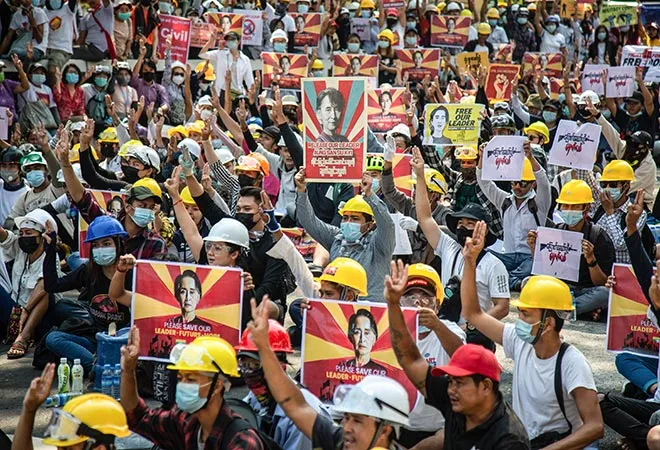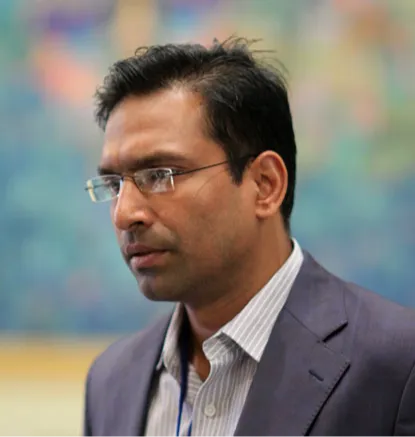There’s currently no end in sight to the growing civil unrest that has gripped Myanmar since its military coup on Feb. 1. As protests grow by the day, Myanmar’s military, the Tatmadaw, has turned to lethal violence to quell demonstrations. So far, the response from the international community has been limited to issuing sanctions and harsh statements condemning the military’s sudden takeover—without altering the situation on the ground. But the coup has taken place at a time when the pandemic has left many civilians in economic despair, and sanctions risk exacerbating a humanitarian crisis. Restoring the civilian government and getting the Tatmadaw to back down will require a much more imaginative response from abroad.
One overlooked solution to Myanmar’s crisis may be the Quadrilateral Security Dialogue, or the “Quad”—the newly reinvigorated forum among Australia, India, Japan, and the United States to share and promote liberal and democratic values in the Indo-Pacific. Although the Quad is often viewed as an anti-China club, the recently concluded meeting hosted by U.S. President Joe Biden revealed it has an inclusive agenda: Quad members decided to launch an ambitious vaccine supply program and formed working groups to explore areas of cooperation on emerging technologies and climate change. Importantly, Quad leaders made it clear that finding an early and peaceful solution to the Myanmar crisis is a top priority.
At first glance, the Quad seems somewhat divided on Myanmar: While Australia and the United States have condemned the coup, India and Japan issued milder statements, perhaps because they were cautious of alienating Myanmar and pushing it toward China. Yet New Delhi and Tokyo could in fact be instrumental in finding a way to end the impasse in Naypyidaw. India and Japan were recently named by Burma Campaign U.K. as two of the top countries still training and cooperating with the Tatmadaw—a fact that also means they have strong leverage over the army.
India and Japan provide an excellent opening for the Quad to anchor a peaceful restoration of democracy while also putting an effective check on China’s opportunistic moves in Myanmar. And the timing for New Delhi and Tokyo to act could not be better, as Burmese protestors increasingly turn on Beijing.
Both India and Japan have a deep understanding of the complex dynamics at play in Myanmar’s power struggle. Since the National League for Democracy assumed power in 2015, Japan’s strategy toward Myanmar has been to maintain communication not only with now-ousted State Counsellor Aung San Suu Kyi and her party but also with the Tatmadaw. Even as the Rohingya crisis escalated in 2017 and the West withdrew investment from Myanmar, Japan continued to invest there and provide foreign aid, making it the third largest investor in and the largest donor to Myanmar. With this leverage, Japan succeeded in brokering a
cease-fire last November between the Tatmadaw and the rebel Arakan Army, which has expanded the armed conflict against the Tatmadaw in the Rakhine state since 2019.
Despite these ties with the Tatmadaw, Japan surprised the international community by taking a clear stance against the coup and speaking up for human rights and democracy. Although the country’s initial response avoided the term “coup,” after the fatal shooting of two peaceful protesters in Mandalay on Feb. 20, Japan strongly condemned the coup and the military’s violence.
India can open back-channel negotiations with senior military officials in Myanmar.
That statement in itself has sway, since the economic and strategic importance of Japan in Myanmar now matches—or even surpasses—that of China. Japan has promoted political stability in Myanmar by providing assistance for the rule of law, governance, and electoral systems by, for example, providing election supplies and dispatching election monitoring teams, building the capacity of officials in local governments, and helping the country upgrade its justice delivery system. The country has also acted as a peacemaker by brokering negotiations with minority groups. (Contrast that with China, which has been funding some ethnic insurgencies). And over the past decade, Japan has developed the Thilawa Special Economic Zone, promoting development in the Yangon metropolitan area. Compared to the Tatmadaw’s distrust of China, the high level of confidence Japan has earned in Myanmar should not be overlooked.
Neither should India’s influence in the country. New Delhi has refrained from outright condemnation of the coup, based in part on its long-held position of noninterference in another country’s affairs, but its ties to Naypyidaw will nonetheless be critical to restoring democracy in the country. After burning its fingers by supporting Myanmar’s democratic movement in 1988 and condemning the 1990 military coup—which played a role in driving the junta to China and arming insurgent groups in the region bordering India—New Delhi has developed a close rapport with the Tatmadaw. Its purposeful outreach through its Act East policy has improved trade and defense relations between the two neighbors and led to, for instance, India launching major infrastructure initiatives, such as the Kaladan Multi-Modal Transit Transport Project and the India-Myanmar-Thailand Trilateral Highway, which are intended to compete with China’s massive infrastructure projects under the Belt and Road Initiative. And India is among a handful of countries that provided more than $1 billion to Myanmar to strengthen its electoral process, revamp service delivery institutions, and provide technical and infrastructure assistance to improve its education and health care services.
This commentary originally appeared in Foreign Policy.
The views expressed above belong to the author(s). ORF research and analyses now available on Telegram! Click here to access our curated content — blogs, longforms and interviews.




 PREV
PREV



